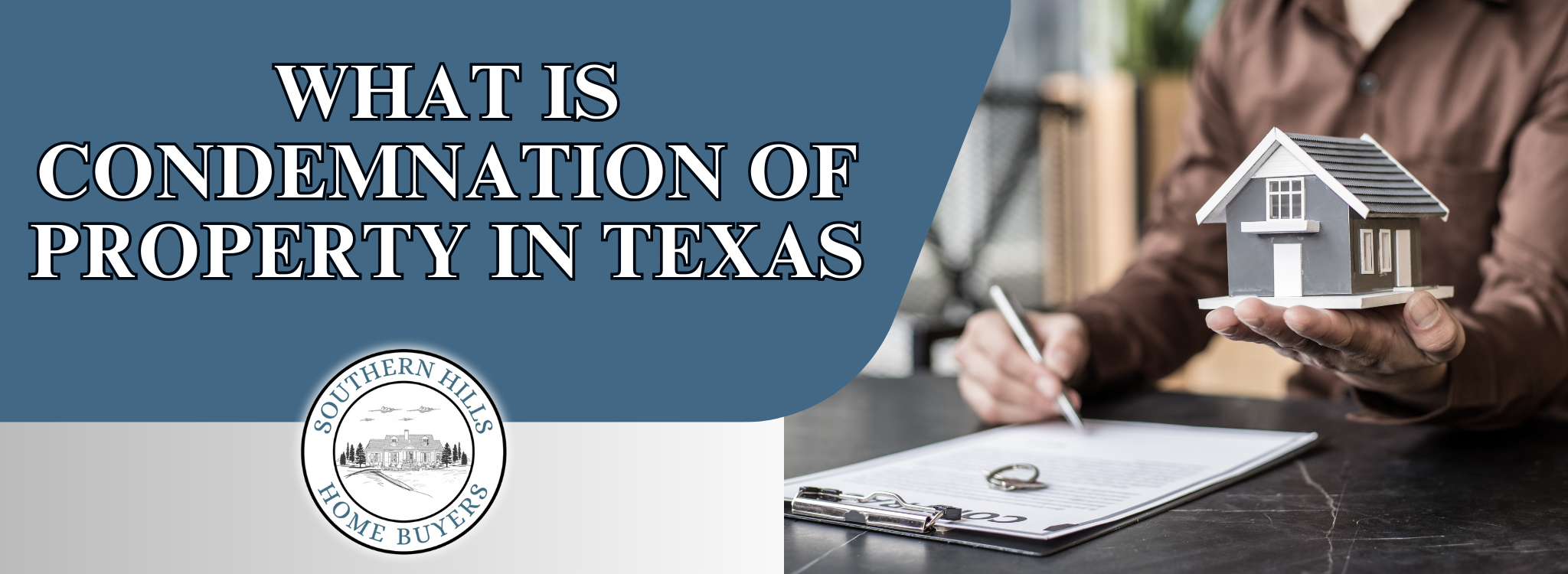
Key Legal Aspects of Property Condemnation in Texas
What are the legal grounds for property condemnation?

In Texas, property condemnation follows the state’s eminent domain laws. The Texas condemnation statute states that the property must be taken for public use. Whether a government agency or a private company with statutory authority, the condemning authority has to prove that acquiring the land is required for public projects, including utilities, infrastructure, or community facilities. Knowing these legal criteria is crucial for property owners facing condemnation.
How is just compensation determined?
In Texas, just compensation ensures property owners receive fair market value for their condemned property. The valuation process considers the property’s current market state, covering location, usage, and development potential. If there’s a disagreement over the property’s value, parties may use valuation dispute resolution, often needing help from expert attorneys. This process aims to give landowners a fair payment reflecting the property’s worth.
Who decides if a property is eligible for condemnation?
A property’s eligibility for condemnation is decided in legal proceedings. A court may decide in Texas, often after a special commissioner hearing. During this hearing, appointed commissioners examine evidence from the condemning authority and the property owner. Additionally, there is a required notification period for condemnation in Texas, allowing landowners time to understand their rights under the Texas Landowner Bill of Rights and prepare for legal challenges.
What rights do landowners have during negotiations?
Texas landowners have certain rights during negotiations on a condemnation settlement. Knowing these rights helps one guard their interests. They have the right to legal representation; hence, they can engage an attorney to help them through the discussions. Should they feel the condemnation is unfair or surpasses legal restrictions, they also have the right to challenge it. Landowners can bargain to get a just compensation and maybe evade court attendance. These rights help landowners guarantee their issues are taken care of and strong in discussions.
The Role of Eminent Domain in Texas Property Laws
How does eminent domain affect property owners in Texas?

How does eminent domain affect Texas property owners?
Eminent domain affects property owners in Texas quite a bit. Projects, including roadways, schools, and utilities, often let the government purchase private land for public use. Although the law mandates that landowners get just compensation, negotiating this process can prove difficult. Landowners who want to defend their interests and make wise decisions regarding eminent domain activities must first understand Texas property rights.
What factors justify the use of eminent domain?
Many important elements support eminent domain in Texas. The main need is that the project benefits society using infrastructure or development, thereby serving public usage. The Texas condemnation laws outline these standards, emphasizing the requirement of government openness and responsibility. Landowners’ legal rights in Texas are vital, providing a way to challenge unjust claims and ensuring fair treatment throughout the process.
Can a property owner appeal an eminent domain decision?
In Texas, property owners can appeal an eminent domain decision if they believe it is unfair or improperly executed. This involves contesting the condemnation in court, where they can question the necessity or fairness of the action. The Texas Supreme Court’s rulings on eminent domain guide these appeals, protecting landowners’ rights through due process. Property owners usually start an appeal by filing a condemnation petition in Texas, seeking a judicial review to overturn an unfavorable decision potentially.
Southern Hills Home Buyers offers valuable insights and support for those dealing with eminent domain issues, helping property owners manage this complex legal landscape effectively.
Influences on Property Value During Condemnation
What Factors Impact the Valuation of Condemned Properties?

In Texas, several key factors affect the valuation of condemned properties. Fair market value is one of the most important factors. It reflects what a willing buyer would pay to a willing seller under current market conditions. The property valuation process in Texas also considers the property’s location, current use, and potential for future development.
Compensation resulting from condemnation can significantly impact property rights in Texas. Understanding these factors helps property owners ensure a fair assessment. Seeking advice from experts knowledgeable in Texas property laws can help maximize compensation.
How Does the Appraisal Process Work in Texas?
In Texas, a certified appraiser performs the appraisal process to determine a property’s value accurately. Here are the main steps involved:
- Initial Inspection: The appraiser checks the property’s condition and any unique features.
- Market Analysis: They review recent sales of similar properties in the area to understand market trends.
- Valuation Approach: Different methods like sales comparison, cost, or income approach may be used depending on the property type.
- Report Submission: A detailed report is prepared with the findings and justification of the appraised value.
Understanding related Texas real estate legal issues helps property owners ensure transparency and accuracy in the property valuation process in Texas.
Can Property Owners Dispute the Appraised Value?
Yes, in Texas, property owners can dispute the appraised value if they believe it is unfair. The valuation dispute resolution process provides several options:
- Consultation with Attorneys: Experienced attorneys can help navigate the dispute process and understand the right to contest condemnation.
- Court Proceedings: Property owners can challenge the valuation in court, where their legal rights as landowners in Texas will be upheld.
- Formal Appeal: A formal appeal process allows property owners to present evidence supporting a different valuation.
Using these options, property owners can ensure their property’s value is accurately represented and fairly compensated during condemnation.
Strategies for Negotiating with Condemning Authorities
What are effective negotiation tactics for property owners?

Negotiating with condemning authorities can be challenging, but using the right strategies can lead to better results. Here are some effective tactics:
- Know Your Rights: Under eminent domain laws, understand your rights as a property owner. This knowledge is essential for protecting your interests in negotiations.
- Collect Evidence: Carefully document the value and use of your property. A detailed property valuation strengthens your position when discussing compensation.
- Hire Professionals: Consult with attorneys who specialize in condemnation settlements. Their expertise can guide you and improve outcomes.
- Negotiate Appropriately: Approach discussions constructively and be open to dialogue. This can help you reach a more favorable agreement.
- Use Public Support: In some cases, gaining public support can pressure authorities to offer a better settlement.
When should a property owner involve an attorney?
Knowing when to involve an attorney is crucial in eminent domain situations:
- Upon Notice: Contact a lawyer when you receive notice of potential condemnation. Early involvement helps protect your legal rights.
- Complex Situations: If your case involves complex legal or valuation issues, a specialized condemnation attorney in Texas can assist.
- Low Offers: If you receive an offer below fair market value, a lawyer can help you challenge it effectively.
- Disputes with Authorities: An attorney is vital if disagreements exist about the taking or the compensation offered.
What are common pitfalls to avoid during negotiations?
Avoiding certain pitfalls can improve your negotiation success:
- Proceeding Without Legal Help: Handling real estate and legal matters without a lawyer can weaken your position. Hire a knowledgeable attorney to protect your interests.
- Neglecting Valuation Details: Ensure you fully understand and document Texas’s property valuation process. Mistakes here can lead to undervaluation.
- Missing Deadlines: Pay attention to all legal deadlines. Missing any can severely affect your legal rights as a landowner in Texas.
- Accepting Initial Offers: Do not accept initial offers without consulting a professional. These offers often do not reflect the property’s true value.
Southern Hills Home Buyers can assist you in navigating these complex situations, ensuring your rights are preserved and your interests prioritized.
Case Studies: Successful Navigation of Condemnation Challenges
How have other landowners successfully challenged condemnation?

Dealing with condemnation proceedings can be tough for landowners. Yet, many cases show how others have effectively protected their legal rights in Texas. It’s important to understand the details of eminent domain and how the Texas Supreme Court views challenges to public use. Some landowners have won inverse condemnation claims, helping them secure fair compensation or contest the need for land acquisition.
Landowners’ strategic legal action—such as contesting the public use requirement or negotiating better terms—typically opens the path for others in analogous circumstances. Knowledgeable legal advice conversant with Texas condemnation rules can greatly change the outcomes of these cases.
What lessons can be learned from notable condemnation cases?
Some outstanding Texas eminent domain cases provide insightful lessons for individuals engaged in legal conflicts or negotiations during condemnation. Court rulings regularly underline the need to settle valuation conflicts to guarantee equitable market value reimbursement. Including professionals, such as an expert witness, in cases of condemnation strengthens a lawsuit and validates claims for more compensation.
Past cases consistently show that successful negotiations or court verdicts depend on solid preparation and strong legal representation. Landowners must gather solid evidence and hire experienced lawyers to improve their negotiating position and potential for favorable outcomes.
How do these examples influence future property rights debates?
The outcomes of important condemnation cases continually shape the development of property rights in Texas. These examples emphasize the significance of the Texas Landowner Bill of Rights, which protects landowners from unfair government property acquisition. They also highlight the ongoing debate over the public use requirement in Texas, a key factor in deciding the legality of government land seizures.
These decisions inspire more general debates on balancing government needs and personal property rights and acting as standards in the next court battles. The knowledge acquired benefits landowners and helps improve the guidelines controlling eminent domain, influencing future legislative and court decisions in Texas property law.
FAQs:
What is real estate condemnation in Texas?
Real estate condemnation in Texas occurs when the government takes private property for public use under eminent domain, ensuring that landowners get fair compensation.
How does property taxation work in Texas?
Property taxation in Texas is based on the property’s annual assessed value. These taxes support local services like schools and infrastructure. Knowing your tax obligations and deadlines is crucial, which differ by county.
What rights do landowners have against property seizure in Texas?
Landowners have the right to fair compensation and can challenge the necessity of public use. They can also dispute the valuation if it does not reflect the market value. It is advisable to consult an expert attorney.
How can I challenge a condemnation notice in Texas?
To challenge a condemnation notice, file an objection with the authorities. Hiring a knowledgeable lawyer in Texas condemnation laws is key to handling the process correctly.
What is inverse condemnation, and how does it apply in Texas?
Inverse condemnation happens when the government uses or damages private property without formal proceedings. Property owners can seek compensation by proving their property rights were effectively taken.
Who might be involved in handling a condemnation case in Texas?
Condemnation cases often involve attorneys specializing in eminent domain, like Hammerle Finley Law Firm, along with appraisers and expert witnesses to assess and testify on behalf of landowners.
What should landowners know about temporary construction easements in Texas?
Temporary construction easements allow project access to private property. Landowners should ensure compensation and restoration terms are clear. Legal guidance is recommended to protect their interests.
How has COVID-19 affected property transactions and condemnation in Texas?
COVID-19 slowed property transactions and increased uncertainties. While legal adaptations occurred, the core rights and procedures around condemnation remain unchanged.
More Resources for Texas Homeowners
Key Insights
- Understanding property condemnation in Texas requires knowledge of processes like inverse condemnation claims and challenges to public use requirements.
- Landowners in Austin facing city or municipal property condemnation should know their rights concerning notice and the notification period for condemnation.
- Eminent domain cases, such as those involving the Texas Department of Transportation or pipeline condemnation, require understanding right-of-way acquisitions and compensable interest evaluations.
- Attorneys like Philip Hundl are crucial in navigating condemnation litigation, including experts in binding arbitration and expert witness testimony.
- Homeowners from Williamson County to El Campo should consider estate planning and probate to address issues relating to federal law or illegal activities that could affect property rights.
- Concerns like fire hazards or oil and gas condemnation in areas like the Permian Basin call for good faith negotiations and understanding of partial taking laws.
- In Amarillo, dealing with entities like Amarillo National Bank or during hardship acquisitions requires acknowledging zoning regulations and contingencies related to the coronavirus outbreak.
- Utility easement condemnation requires awareness of mitigation steps, while compensation discussions can involve public or private consultations through podcasts or informative blogs.
- Professional guidance is essential for landowners, whether challenging the validity of public use or navigating early possession and temporary utility arrangements.
This information applies to Texas, including cities like Dallas, Houston, Austin, Fort Worth, El Paso, and nearby areas. Need assistance? Please explore our website for helpful resources, and contact us today at (214) 225-3042. We’re ready to help!
Get Cash For Your Texas House Today
We buy houses in Texas without the hassle and red tape. Get your no-obligation cash offer for your home and just be done. Selling in as-is condition has never been easier.

Author: Brandon Beatty
Brandon Beatty’s passion is buying income producing properties and building businesses. He focuses on buying houses and small multi family buildings in Texas that have an opportunity to add value through proper management and renovations while helping property owners sell quickly and without the hassles of a traditional sale.
Brandon is the founder of Southern Hills Home Buyers and has been featured on real estate news sites, including Zillow, Redfin, Realtor.com, HomeLight, List With Clever, Offerpad, and OpenDoor.




